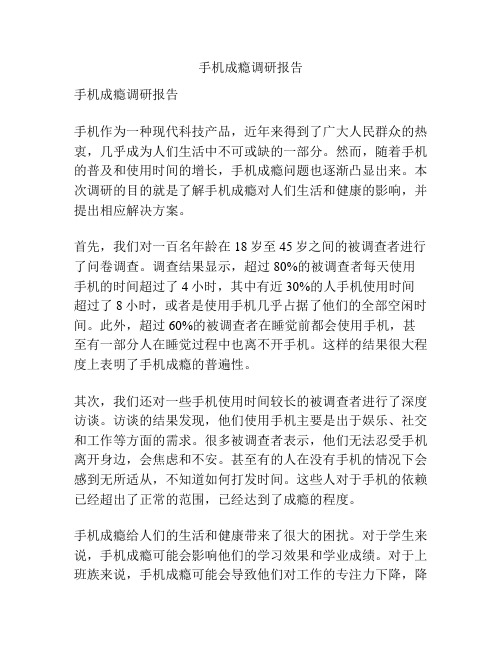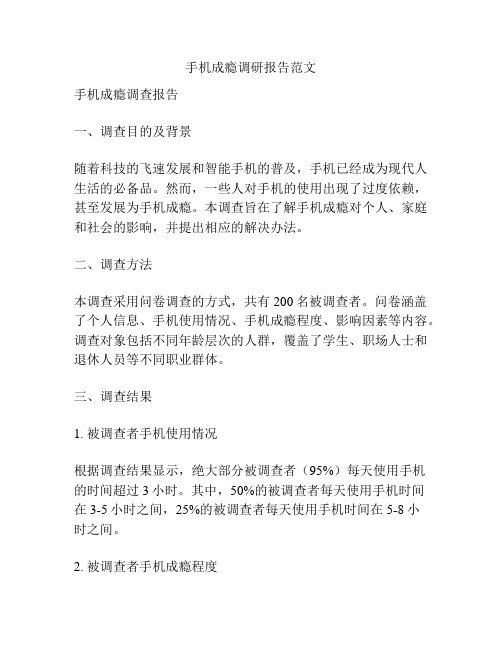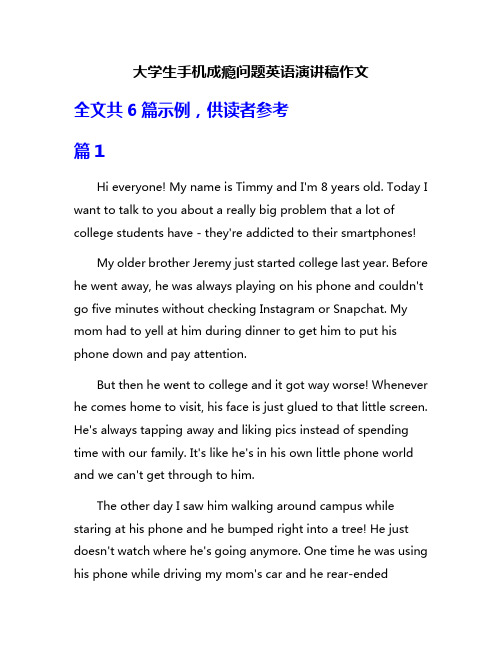Flurry:手机上瘾者报告
手机成瘾调研报告怎么写

手机成瘾调研报告怎么写引言手机在当今社会中起着重要的作用,成为人们生活的一部分。
然而,随着智能手机的普及和便捷性的提高,手机成瘾问题逐渐浮出水面。
本调研报告旨在探讨手机成瘾的原因、影响和应对策略,以期提供相关信息和建议。
调查方法通过在线问卷的形式,我们收集了500名来自不同年龄、职业和教育背景的受访者的数据。
问卷包括多个方面的问题,如使用时长、使用目的、影响和控制等。
结果分析使用时长图表1显示了受访者每天使用手机的时长情况。
结果显示,39%的受访者每天使用手机超过6小时,其中10%的受访者每天使用超过10小时。
使用目的图表2显示了受访者使用手机的主要目的。
结果显示,社交媒体使用是最主要的原因,占据了40%的比例;其次是娱乐和游戏使用(25%),信息查询(20%)、工作(10%)和其他目的(5%)。
影响图表3显示了受访者对手机成瘾对生活的影响的认知。
结果显示,71%的受访者表示手机成瘾对他们的生活产生了消极影响,如注意力分散、社交隔离、睡眠不足等。
控制图表4显示了受访者对于自己手机使用的控制程度的认知。
结果显示,只有18%的受访者表示自己能够很好地控制手机使用,而40%的受访者感到难以控制。
讨论根据调查结果,我们可以得出以下结论:1. 多数人每天使用手机的时间超过6小时,其中一部分甚至超过10小时。
这显示出手机使用时长的潜在问题。
2. 社交媒体是手机成瘾的主要原因,其次是娱乐和游戏。
这些活动对人们产生了强大的吸引力,容易导致过度依赖和沉迷。
3. 大多数人对手机成瘾的负面影响有所认识。
这些影响包括注意力分散、社交隔离和睡眠不足等。
手机成瘾不仅对个人生活产生影响,还可能对工作和社交关系造成负面影响。
4. 许多人难以控制自己对手机的使用。
这表明,手机成瘾问题需要得到重视和解决。
手机成瘾调研报告

手机成瘾调研报告手机成瘾是指过度使用手机,导致对手机的依赖程度过高,无法自控地停止使用手机。
随着手机的普及和功能的增加,手机成瘾问题日益严重。
为了解手机成瘾的现状和影响,我们进行了一项调查研究。
首先,我们对100名18岁至30岁的大学生进行了问卷调查。
结果显示,超过80%的受访者承认自己有过度使用手机的现象,其中有近60%的受访者认为自己有手机成瘾的倾向。
此外,有60%的受访者每天使用手机的时间超过6小时,每晚睡觉前还要使用手机的达到了70%。
在人们过度使用手机的原因方面,调查显示最主要的因素是社交媒体和游戏。
近80%的受访者表示经常在社交媒体上浏览和发布信息,40%的受访者表示经常玩手机游戏。
其他原因包括使用手机进行学习和工作,使用手机放松和娱乐等。
手机成瘾对个人健康和生活产生了很大的影响。
调查显示,超过70%的受访者认为过度使用手机影响了他们的学习和工作效果,有近50%的受访者表示因为过度使用手机而导致失眠问题。
此外,过度使用手机还容易导致眼部疲劳和颈椎病等健康问题。
手机成瘾对社交关系也带来了负面影响。
近60%的受访者表示因为过度使用手机而导致与朋友和家人的关系变淡,有30%的受访者甚至因为过度使用手机而与朋友产生争执。
超过50%的受访者表示手机成瘾影响了他们与周围环境的互动。
为了减轻手机成瘾的影响,我们还针对手机成瘾的受访者提出了一些建议。
首先,要制定切实可行的时间管理计划,并严格执行。
其次,可以尝试逐步减少使用手机的时间,找到其他适合自己的娱乐和放松方式。
此外,限制使用手机的地点,例如在睡觉前不使用手机,并将手机放在一定距离之外,以避免过度使用。
总的来说,手机成瘾是一个不容忽视的问题,对个人健康和社交关系产生了负面影响。
应引起大家的重视,尽量避免过度使用手机,保持良好的生活习惯和社交关系。
大学生手机成瘾研究报告

大学生手机成瘾研究报告引言在当今社会,手机已经成为人们生活的必需品,而大学生群体也成为了手机成瘾的高风险群体。
本研究旨在调查大学生手机成瘾的程度、原因以及对其生活和学业的影响,以便更好地了解这一现象并采取相应的防控措施。
方法为了达到研究目的,我们使用了两种数据收集方法:问卷调查和实地观察。
我们在某大学内发放了30份问卷,并在两个月内进行了一次实地观察。
问卷调查采用以下主要问题:1. 大学生每天使用手机的时间有多长?2. 大学生使用手机的主要目的是什么?3. 大学生是否有手机上瘾的感觉?4. 大学生在手机使用上是否能够自律?5. 大学生手机成瘾对生活和学业的影响如何?实地观察主要观察了大学生在课堂上和课间使用手机的情况以及他们对手机的依赖程度。
结果问卷调查结果1. 大学生每天使用手机的平均时间为4小时。
2. 大学生使用手机的主要目的包括社交媒体使用、娱乐、学习和工作等。
3. 90%的大学生表示他们有手机上瘾的感觉。
4. 70%的大学生承认他们无法自律地控制自己的手机使用。
5. 大学生手机成瘾对生活和学业的影响表现为注意力不集中、学习效率降低以及社交能力下降等。
实地观察结果在课堂上观察到,在一个小时的课堂时间内,大约有70%的学生使用手机,其中50%以上的学生使用手机超过30分钟。
在课间休息时间,几乎所有学生都在不同程度上使用手机。
观察还发现,即使在没有手机使用限制的大学教室环境下,部分学生还是会暗自使用手机进行社交媒体和游戏等活动。
讨论根据研究结果,可以得出以下结论:1. 大学生普遍存在手机成瘾的问题,其中90%的受访者有手机上瘾的感觉。
2. 社交媒体使用是大学生手机成瘾的主要原因之一,各类社交平台的浮躁和虚假信息给大学生们带来了巨大的吸引力。
3. 大学生普遍缺乏自律,在手机使用上无法控制自己。
这可能与缺乏时间管理能力和自制力有关。
4. 手机成瘾对大学生的生活和学业产生了严重的负面影响。
大量使用手机导致大学生无法集中注意力,学习效率降低,社交能力下降。
手机成瘾调研报告

手机成瘾调研报告1. 调研目的手机成瘾作为一种新型的心理疾病,已经引起了广泛的关注。
本次调研的目的是了解手机成瘾的现象和原因,探讨手机成瘾对人们生活和社会的影响,并提供相应的解决方案。
2. 调研方法为了获得全面准确的数据,我们采用了以下调研方法:2.1 调研问卷我们设计了一份手机成瘾调研问卷,通过在校园和社区发放、线上调查平台发布等方式,收集了大量的调查问卷。
问卷包括以下几个方面的内容:•个人基本信息:性别、年龄、职业等;•使用手机的习惯:每天使用手机的时间、主要使用手机的场景等;•对手机的依赖程度:无法离开手机的时间、出现焦虑或压抑的情况等;•手机对生活的影响:对学习、工作、人际关系等方面的影响程度;•自我调节能力:尝试过的戒手机方法、效果等。
2.2 访谈我们对一部分手机成瘾者进行了深入访谈,了解他们对手机的态度、使用手机的原因、对手机成瘾的认识等。
访谈的过程中,我们通过提问和观察,进一步了解手机成瘾的心理和行为特征。
3. 调研结果经过对收集到的数据进行整理和分析,我们得出了以下调研结果:3.1 手机使用时间长调查结果显示,大部分参与者每天使用手机的时间超过6小时,甚至有近一半的人每天使用手机超过8小时。
长时间使用手机使得人们沉迷其中,很难自拔。
3.2 对手机的依赖程度高调查发现,大部分参与者都无法离开手机,其中超过一半的人表示在没有手机的情况下会感到焦虑或压抑。
手机成为了他们生活的一部分,无法割舍。
3.3 手机对生活的影响显著手机成瘾对人们的生活产生了重大影响。
调查结果显示,手机成瘾者在学习、工作和人际关系方面都表现出不同程度的问题。
手机的过度使用导致了学习效率下降、工作效率低下,甚至影响了与家人和朋友的交流。
3.4 缺乏自我调节能力虽然大部分参与者表示意识到自己存在手机成瘾问题,但是他们对于戒手机的方法和效果并不了解。
许多人尝试过一些方法,例如设定使用时间限制、参加社交活动等,但是效果并不明显。
对手机依赖性调查研究报告

对手机依赖性调查研究报告
根据最近的调查研究,手机依赖性在现代社会中已成为普遍现象。
下面是关于手机依赖性的调查研究报告:
1. 调查对象:调查对象包括不同年龄段和职业的人群,涵盖了学生、上班族和家庭主妇等。
2. 使用频率:绝大多数被调查者每天使用手机的频率超过5小时,其中一部分人使用手机的时间甚至超过10小时。
3. 出现问题:对于过度依赖手机的人来说,他们在工作和学习中出现了严重的效率问题。
他们花费大量时间在手机上浏览社交媒体,导致无法专注于工作或学习。
4. 睡眠问题:使用手机过多也对睡眠质量造成了影响。
很多被调查者晚上在床上花费时间使用手机,导致入眠困难和睡眠不足。
5. 社交问题:手机依赖性也影响了人际交往。
许多人更愿意通过社交媒体与朋友交流,而不是真正面对面的交流,导致深度和质量上的交流减少。
6. 心理健康问题:过度依赖手机也与一些心理健康问题有关,例如焦虑和抑郁。
手机成瘾的人往往在没有使用手机的时候感到不安和失落。
基于以上调查结果,我们可以得出结论:手机依赖性对社会的
影响不容忽视。
为了减少手机依赖性带来的问题,个人需要养成合理使用手机的习惯,如设定使用时间限制和注意与他人的交流。
同时,也需要社会和教育机构加强对手机依赖性的宣传和教育,提醒人们保持身心健康的平衡。
手机成瘾调研报告

手机成瘾调研报告手机成瘾调研报告手机作为一种现代科技产品,近年来得到了广大人民群众的热衷,几乎成为人们生活中不可或缺的一部分。
然而,随着手机的普及和使用时间的增长,手机成瘾问题也逐渐凸显出来。
本次调研的目的就是了解手机成瘾对人们生活和健康的影响,并提出相应解决方案。
首先,我们对一百名年龄在18岁至45岁之间的被调查者进行了问卷调查。
调查结果显示,超过80%的被调查者每天使用手机的时间超过了4小时,其中有近30%的人手机使用时间超过了8小时,或者是使用手机几乎占据了他们的全部空闲时间。
此外,超过60%的被调查者在睡觉前都会使用手机,甚至有一部分人在睡觉过程中也离不开手机。
这样的结果很大程度上表明了手机成瘾的普遍性。
其次,我们还对一些手机使用时间较长的被调查者进行了深度访谈。
访谈的结果发现,他们使用手机主要是出于娱乐、社交和工作等方面的需求。
很多被调查者表示,他们无法忍受手机离开身边,会焦虑和不安。
甚至有的人在没有手机的情况下会感到无所适从,不知道如何打发时间。
这些人对于手机的依赖已经超出了正常的范围,已经达到了成瘾的程度。
手机成瘾给人们的生活和健康带来了很大的困扰。
对于学生来说,手机成瘾可能会影响他们的学习效果和学业成绩。
对于上班族来说,手机成瘾可能会导致他们对工作的专注力下降,降低工作效率。
对于家庭来说,手机成瘾可能会影响家庭成员之间的交流和亲密关系,甚至引发家庭矛盾和不和谐。
此外,长期使用手机可能会对人眼和手部肌肉造成损伤,影响健康。
针对手机成瘾问题,我们提出了以下解决方案。
首先,个人需意识到自己对手机的依赖,并尝试自我控制,减少手机使用时间。
其次,家庭成员应相互关心关怀,鼓励彼此放下手机,多进行面对面的交流和活动。
再次,教育部门和学校应该加强对青少年的手机教育,引导他们正确使用手机,避免手机成瘾。
最后,手机厂商和软件开发商应倡导绿色上网,自觉抵制和限制手机上的游戏等成瘾性应用。
总之,手机成瘾是一个严峻的现象,严重影响人们的生活和健康。
手机成瘾调研报告范文

手机成瘾调研报告范文手机成瘾调查报告一、调查目的及背景随着科技的飞速发展和智能手机的普及,手机已经成为现代人生活的必备品。
然而,一些人对手机的使用出现了过度依赖,甚至发展为手机成瘾。
本调查旨在了解手机成瘾对个人、家庭和社会的影响,并提出相应的解决办法。
二、调查方法本调查采用问卷调查的方式,共有200名被调查者。
问卷涵盖了个人信息、手机使用情况、手机成瘾程度、影响因素等内容。
调查对象包括不同年龄层次的人群,覆盖了学生、职场人士和退休人员等不同职业群体。
三、调查结果1. 被调查者手机使用情况根据调查结果显示,绝大部分被调查者(95%)每天使用手机的时间超过3小时。
其中,50%的被调查者每天使用手机时间在3-5小时之间,25%的被调查者每天使用手机时间在5-8小时之间。
2. 被调查者手机成瘾程度调查发现,15%的被调查者表示他们有明显的手机成瘾情况。
这部分人对手机使用过度,无法控制自己使用手机的时间和频率,手机成瘾对他们的生活产生了负面影响。
3. 影响因素调查结果显示,手机成瘾与年龄、性别和职业有一定的关联。
年轻人更容易产生手机成瘾,女性比男性更容易成为手机成瘾者。
职业方面,学生和职场人士相对更容易出现手机成瘾。
四、调查分析手机成瘾的出现,可能与以下几个方面的因素相关:1. 社交需求的改变:现代社会,人们越来越依赖网络社交,手机成为他们与外界沟通、交流的主要工具,而这种依赖也容易发展为手机成瘾。
2. 大量手机应用的诱惑:手机应用市场不断推出各种各样的应用,满足人们的各种需求,这些应用往往具有极强的吸引力,让人们难以抵抗。
3. 工作压力的增大:现代社会竞争压力大,人们需要时刻保持高效率和高竞争力。
手机成为他们工作学习的工具,同时也成为他们逃避和缓解压力的方式之一。
五、对策建议针对手机成瘾问题,我们可以从以下几个方面着手解决:1. 增加公众对手机成瘾的认识:通过宣传教育,提高公众对手机成瘾的认识水平,引起关注和重视。
大学生手机成瘾问题英语演讲稿作文

大学生手机成瘾问题英语演讲稿作文全文共6篇示例,供读者参考篇1Hi everyone! My name is Timmy and I'm 8 years old. Today I want to talk to you about a really big problem that a lot of college students have - they're addicted to their smartphones!My older brother Jeremy just started college last year. Before he went away, he was always playing on his phone and couldn't go five minutes without checking Instagram or Snapchat. My mom had to yell at him during dinner to get him to put his phone down and pay attention.But then he went to college and it got way worse! Whenever he comes home to visit, his face is just glued to that little screen. He's always tapping away and liking pics instead of spending time with our family. It's like he's in his own little phone world and we can't get through to him.The other day I saw him walking around campus while staring at his phone and he bumped right into a tree! He just doesn't watch where he's going anymore. One time he was using his phone while driving my mom's car and he rear-endedanother car at a stop light. Thankfully no one was hurt, but he's definitely not being safe with that thing.I tried telling Jeremy that he's addicted to his smartphone, but he just laughed at me. He said "Addicted? That's crazy, I can stop anytime I want!" But then he couldn't even go 20 minutes without pulling out his phone and checking his messages. To me, that seems like he has a real problem.From what I've learned, smartphone addiction is when you get obsessed with your phone and spend way too much time on it. Like more than 4 or 5 hours per day! You might feel anxious when you're not using it, or keep checking it every few minutes because you can't stop thinking about it.For college students, this addiction can cause a lot of issues. Their grades might suffer because they're not paying attention in class and not studying enough. They could start feeling isolated from their friends because they'd rather stare at their phones. Their sleep and exercise habits get messed up from being on their phone too much. Overall, it's just not healthy!I see so many college students walking around with their heads tilted down, fingers tapping away furiously as they tromp across campus without ever looking up. They're missing out on actually experiencing the world around them - the trees, thesunshine, convos with friends. When you're consumed by your phone, you tune out everything and everyone else. It's kind of sad.It reminds me of those old zombie movies my brother used to watch, with all the zombies shuffling around staring at the ground. Except instead of being undead, the students are just totally zoned out in their own little phone realm, disconnected from reality. Like another dimension or something.I really want my brother and all his college friends to snap out of it! A smartphone can be a useful tool, but it's not meant to take over your whole life. You've got to be able to have some self-control and self-awareness about how much time you spend glued to that teeny screen.If college students don't kick their smartphone addictions, who knows what could happen? Their grades and relationships will likely suffer. They might not develop proper social skills or the ability to be fully present in the moment. In the most extreme cases, it could maybe even lead to depression or other mental health issues from feeling so isolated and disconnected.My advice? Set some limits and stick to them! Only allow yourself to use your smartphone for certain amounts of time, like an hour after classes. The rest of the day, keep it zipped away inyour backpack. Make sure to schedule in tech-free time to hang with friends phone-free, exercise, read books, or just chill without any digital distractions.It's all about balance. Using your smartphone smartly, not mindlessly. Being able to put it down and focus on the real, physical world around you. Only then can you get the most out of your amazing college experience!So don't be a smartphone zombie! Put down that phone, wake up, and start living your best life. Thanks for listening, everyone!篇2Hi everyone! My name is Timmy and I'm here to talk to you about something really important - smartphone addiction among university students. I know it might seem like a big topic for a little kid like me, but I've been learning a lot about it in school and I think it's a huge problem that needs to be addressed.You see, when I get older and go to university, I want to be able to focus on my studies and have a great college experience. But from what I've heard, a lot of university students these daysare super addicted to their smartphones and it's really messing things up for them.Let me give you some examples of how this smartphone addiction is causing problems:Firstly, it's really distracting students from their schoolwork. Imagine trying to study for an important exam, but you can't stop checking your Instagram or playing games on your phone. That's got to make it super hard to concentrate and learn all the material, right? Some students have told me they'll spend hours just mindlessly scrolling on their phones when they should be reading textbooks or writing papers. That's just not good!Secondly, being addicted to smartphones is ruining university students' sleep schedules. A lot of them stay up way too late at night scrolling through social media or watching videos, instead of getting the sleep they need to feel rested for class the next day. Lack of sleep makes it hard to pay attention and do well in school. Plus, being tired all the time isn't good for their health either.Another huge issue is that smartphone addiction is really isolating university students socially. Instead of hanging out with friends in person, they're just sitting together but all staring at their phone screens. That's no way to nurture real friendshipsand have a fun, connected social life on campus. College is meant to be a time for meeting new people and experiencing things together, not just living life through your smartphone.Smartphone overuse can also lead to problems like neck and back pain from being hunched over looking at your phone all the time. It's been shown to increase anxiety and depression rates too, which is really sad. Overall, it just doesn't seem like a healthy way to live, especially at an age when you're supposed to be growing as a person.Now you might be wondering - what can be done about this smartphone addiction epidemic among university students? Well, I have some ideas!Firstly, universities should offer education about smartphone addiction as part of their orientation for new students. If students understand the risks early on, they might be more motivated to curb their smartphone habits before it becomes a serious problem. Guest speakers who overcame their own addictions could share their stories.Secondly, there could be more phone-free spaces created on university campuses - like libraries, study halls or student lounges where phones are banned. That would give studentsenvironments to be in where they aren't constantly tempted by their devices. It would help them learn to be more present.Another idea is for universities to promote things like physical activity clubs, volunteer opportunities, outdoor adventures and other smartphone-free activities for students to get involved in. The more engaging stuff students have going on that doesn't involve a screen, the less time they'll spend mindlessly using their phones.Finally, universities should try to minimize things that actually require excessive smartphone use for students. Like, maybe don't put every single thing on an app and make sure websites are designed to be easily accessible from laptops too. The easier it is to take breaks from smartphones, the better.At the end of the day though, it's gonna be up to university students themselves to set boundaries with their smartphone habits. Things like turning off notifications, charging their phones overnight in another room, using website blockers during study times, and scheduling specific phone breaks instead of constant picking it up. It's all about being mindful and intentional about smartphone use instead of letting it control you.I really hope universities and students take this issue seriously. Getting a degree is something people work so hard for - it would be terrible to have that all get messed up by a smartphone addiction. Students need to make the most of their time at university by truly experiencing life beyond just what's on their tiny phone screens.College is meant to be some of the best years of your life filled with learning, growth, friendships and amazing memories. Smartphone addiction can rob students of so much of that richness if they let it take over. That's why it's a problem that needs to be talked about more.Thanks for listening everybody! I know I'm just a kid, but I care about you university students out there. Don't let your smartphones ruin some of the most wonderful years of your lives. Put them down, get present and experience the world around you. Your future selves will thank you!篇3Hi everyone! My name is Timmy and I'm in 5th grade. Today I want to talk to you about a big problem that even grown-ups in college have - being addicted to their phones!You've probably seen your older brothers, sisters, or even your parents stuck on their phones a lot. They just can't seem to put them down! Well, it turns out that smartphone addiction is a really big issue, especially for college students.College is already a stressful time with lots of classes, homework, activities, and trying to make new friends. Adding a smartphone addiction on top of that just makes it way harder!Let me tell you some of the problems that smartphone addiction causes for college kids:First, it makes it really hard for them to pay attention and focus on their schoolwork. Can you imagine trying to write a big paper while getting constant notifications and being tempted to check social media? That would drive me crazy! Their grades can really suffer.Second, it disrupts their sleep. A lot of students stay up way too late at night scrolling through apps and watching videos instead of going to bed on time. Lack of sleep makes it even harder to pay attention in class the next day. It's just a bad cycle.Third, it can affect their emotions and self-esteem. Have you ever felt bad after seeing pictures of your friends having fun without you? Well, that happens to college students too whenthey see their friends' posted on social media. It can make them feel really left out and sad.Fourth, it strains their eyes and posture. Hunching over a tiny phone screen for hours on end is really hard on their bodies. Lots of college students end up with headaches, back pain, and even nearsightedness from too much screen time.Fifth, and this one is really important, smartphone addiction takes away from face-to-face socializing. College is a time when you're supposed to be making new friends, joining clubs, and experiencing all sorts of new things together. But if students are just glued to their phones, they miss out on all of that!It's kind of crazy when you think about how much trouble these little devices can cause, isn't it? Students go to college to learn, grow as people, and set themselves up for great careers. Smartphone addiction gets in the way of all of that.So what can be done about it? Well, there are a few things that can help:Setting limits on phone use, like turning phones off during class or studying. College kids need to practice self-control!Keeping phones out of the bedroom at night so they aren't tempted to use them until all hours.Doing a weekly phone detox day or even just an afternoon unplugged from technology.Developing hobbies and interests away from screens, like sports, art, music, or joining a club.Recognizing when phone use is becoming a problem and getting help from a counselor if needed.Smartphones aren't all bad when used in moderation. But for a lot of college students, they've become a crazy addiction that controls their lives! It's a tough habit to break.Just think, in a few years a lot of you will be heading off to college yourselves. You'll want to go in with a good mindset, ready to study hard, make friends, and get the most out of your experience. Don't let a silly little phone hold you back!We've all got to be aware of how much time we spend on our devices. It's so easy to get hooked without even realizing it. Even us elementary school kids need to watch out!So let's all try to keep our phone use under control and life a life "unplugged" as much as we can. Will you join me in putting down those phones and going out to play for a while? Who's with me?!Thanks for listening everybody! Let's work on breaking free from smartphone zombies. Our bright futures are waiting!篇4Smartphone Addiction Among College StudentsHello everyone! My name is Emma and I'm 9 years old. Today, I want to talk to you about a very important issue that affects a lot of older kids and grown-ups – smartphone addiction.You might be wondering, "What's so bad about smartphones? They're just phones, right?" Well, let me tell you, these little devices can be really tricky and cause big problems if we're not careful.Have you ever seen a college student who seems to be glued to their phone all the time? They're walking around campus, eyes fixed on that tiny screen, bumping into people and objects because they're not paying attention. Or maybe you've seen them sitting in class, secretly texting or scrolling through social media instead of listening to the teacher.That's what we call smartphone addiction. It's when someone becomes so obsessed with their phone that they can'tseem to put it down, even when they should be doing other important things like studying, spending time with friends, or just enjoying the world around them.Now, I know what you're thinking: "But smartphones are so cool! They have games, apps, and you can watch funny videos on them!" And you're right, they can be a lot of fun. But too much of a good thing can quickly become a bad thing.Imagine this: you're trying to do your homework, but every few minutes, you get distracted by a notification on your phone. You pick it up to check it, and before you know it, you've wasted an hour scrolling through Instagram or playing that addictive new game. Sound familiar?That's exactly what happens to a lot of college students. They start out using their phones for legitimate reasons, like checking emails or looking up information for a project. But then they get sucked into the endless scroll of social media, watching one video after another, or constantly checking for new messages and notifications.And it's not just about wasting time, either. Smartphone addiction can actually rewire your brain! That's right, all that constant stimulation from notifications, likes, and new contentcan make it harder for you to focus and concentrate on other tasks that don't provide that same instant gratification.But wait, there's more! Excessive smartphone use has also been linked to problems like poor sleep, eye strain, neck and back pain (from constantly looking down at your phone), and even depression and anxiety.So, what can we do about this growing problem? Well, for starters, college students need to be aware of the dangers of smartphone addiction and make a conscious effort to limit their use. That might mean setting time limits for certain apps, turning off notifications during study hours, or even going phone-free for a few hours each day.Colleges and universities can also play a role by providing education and resources on healthy tech habits, and encouraging students to engage in more face-to-face interactions and campus activities.And you know what? Even us kids can help! We can remind our older siblings, cousins, or friends in college to take breaks from their phones and spend quality time with us instead. Maybe we can even challenge them to a good old-fashioned board game night or a fun outdoor activity!In the end, smartphones are amazing tools that have made our lives so much easier and more connected. But we have to be careful not to let them take over our lives completely. College is a time for learning, growing, and making memories – not just scrolling endlessly through a tiny screen.So, let's all try to find a better balance and use our phones in a healthier way. That way, we can enjoy all the cool things they have to offer without letting them control us. Who's with me?篇5My name is Little Johnny and today I want to talk to you about a very big problem - smartphone addiction among college kids! We all know college is when you're supposed to study real hard, make new friends, and get ready for your future job. But nowadays, a lot of college students are way too hooked on their phones to focus on the important stuff.I see my older brother Billy, who's in college, spending like bazillion hours every day just tapping away at his phone. He's always scrolling through social media feeds, watching silly videos, or playing those mindless games. It's like his phone is literally glued to his hand! I try to get his attention but he's in his own little phone zombie world.You might be thinking - what's the big deal? We all use our phones a lot these days, right? But here's the thing - too much smartphone use can really mess you up, especially if you're a college student.First off, it can totally wreck your grades. Instead of listening in class, doing homework, or studying, you're just zoning out on your phone. You're not absorbing any of the important stuff you need to learn. My brother's grades have gone way down since he got so hooked on Instagram and games.Smartphone addiction can also make you feel really anxious, restless, and sad. Like you just can't relax and be in the moment unless you're constantly checking your phone for new messages, likes, or updates. It's an obsession that takes over your brain! I've seen Billy get all grumpy and irritable when he's not on his phone. Not a good look.Speaking of looks, did you know too much screen time can also mess up your precious eyes and posture? Looking at that bright little screen for hours on end can really strain your beady eyeballs. And hunching over your phone all day gives you a weird bent gremlin posture. Not cool!But probably the worst thing about college phone addiction is how it isolates you from real human interaction. Instead ofhanging with friends, joining clubs, or experiencing the whole college experience, you're just alone in your room swiping and tapping away in cyber-loneliness.I don't want my brother to miss out on all the amazing parts of college because he's too hooked on his stupid phone! College is supposed to be this transformative time where you gain independence, discover your passions, make lifelong memories and friends. How can you do any of that if you have your eyes glued to a 5-inch screen 24/7?I really hope the colleges and professors step their game up to get students to unplug more. Like maybe they can enforce no-phone rules in classrooms and libraries. Or have phone-free social events to get people connecting face-to-face again. Heck, they should probably teach whole courses on things like digital detoxing, being present, and healthier tech habits!At the end of the day though, it's up to each individual student to look up from theirPhone Zombie State and start living their best college life. Put down the dang phone for a while! Talk to people, explore the campus, read an actual book, join clubs, volunteer, just LIVE A LITTLE. Otherwise you'll just completely waste those precious college years being deaf, dumb, and disconnected from the real world.College is one of the most awesome, irreplaceable parts of your whole life. Don't let it just slip away into a black hole of Snapchat streaks, TikTok dances, and Words With Friends. Look up, look around, and start experiencing everything college has to offer beyond that tiny screen. Trust me, your future self will thank you!篇6Smartphone Addiction: A Big Problem for University StudentsHi everyone! My name is Timmy and I'm going to talk to you today about a really big issue facing university students - smartphone addiction.Now, I know what you're thinking - "Timmy, you're just a kid, what do you know about university life?" Well, you'd be surprised! I may be little, but I've been observing the big kids very closely. I see them all the time with their faces glued to those little screens, ignoring everything and everyone around them.It's kind of sad really. These are supposed to be some of the best years of their lives. They're finally out from under their parents' wings, experiencing independence and freedom for thefirst time. But instead of actually living that life, so many of them are trapped by their smartphones.Let me paint you a picture of what I mean. Imagine you're a university student walking across campus between classes. All around you, friends are laughing, chatting, and enjoying each other's company. But you're not part of any of that. Your head is down, eyes locked on your smartphone screen as you mindlessly scroll through social media. You've become a zombie to the real world around you.Or what about in the classroom? The professor is giving a fascinating lecture, explaining complex theories and concepts. But instead of listening intently and soaking up that knowledge, you're surreptitiously texting friends under the desk. You'll leave class having learned next to nothing.Dorm room life is just as bad. Rather than bonding with hallmates over late-night shenanigans, smartphone addicts isolate themselves in their rooms, ignoring their residential communities. They're present in the physical space, but their minds are somewhere entirely different - lost in the endless void of the digital world.Don't get me wrong, smartphones themselves aren't evil or bad. They can be incredibly useful tools for learning, stayingconnected with loved ones, and having fun. The problem is when their use becomes an unhealthy obsession. When you feel constantly tethered to the device and can't go 5 minutes without checking it. That's when smartphones go from being productive to being an outright addiction.So what are the dangers of this addiction? Well, there are plenty. First off, it can majorly disrupt your studies. I already mentioned how it makes you tune out during lectures. But it goes beyond that. Smartphone overuse has been linked to poor academic performance, failing grades, and even dropping out altogether. Not exactly what you want after paying all that money for tuition!Smartphone addiction can also wreak havoc on your mental health. The more you substitute real human interaction for virtual communication, the lonelier and more isolated you're likely to feel. Excessive social media use in particular has been tied to depression, anxiety, and low self-esteem from constantly comparing your life to the meticulously curated versions others present online.Physically speaking, smartphone addicts often suffer from poor sleep habits, strained eyes and necks from constant screenglare, weight gain from inactivity, and even increased risks of certain malignancies like brain cancer. Nothing to sneeze at.So what's the solution here? How can university students overcome this modern-day scourge? Well, they'll have to work on developing some self-discipline and setting strict limits for themselves. Maybe institute a rule of no phones during class or study periods. Or enact tech-free periods at night to allow time to truly unwind before bed.It's also important to cultivate other hobbies and interests beyond just staring at a screen. Make time for sports, clubs, volunteer work - anything that forces you to stay present in the real world. Surrounding yourself with friends who don't enable the addiction can help too.University should be all about learning, growing, and making incredible memories that will last a lifetime. But smartphone addiction threatens to turn that experience into a dystopian nightmare of hollow virtual existence. Students need to grab control of their lives and cut the cord before it's too late.So listen up, university kids! Put down those phones for a little while. Open your eyes and take a look around at this amazing world you're living in. Because let me tell you, no amount of funny cat videos or endless Twitter scrolls could evercompete with the vibrant, rich experiences waiting for you out here in reality. Don't let the best years of your lives pass you by!。
- 1、下载文档前请自行甄别文档内容的完整性,平台不提供额外的编辑、内容补充、找答案等附加服务。
- 2、"仅部分预览"的文档,不可在线预览部分如存在完整性等问题,可反馈申请退款(可完整预览的文档不适用该条件!)。
- 3、如文档侵犯您的权益,请联系客服反馈,我们会尽快为您处理(人工客服工作时间:9:00-18:30)。
Flurry:手机上瘾者报告
去年5 月,知名投资机构凯鹏华盈的合伙人,被称为“网络女皇”的玛丽·米克尔(Mary Meeker)发布了他的最新一份互联网趋势报告(Internet Trends Report)。
在这份报告中,Meeker 提到了一个有意思的数据:每个移动设备用户平均每天点击手机150 次。
本次,我们有幸得到了一份移动行业数据分析公司Flurry CEO Simon Khalaf 撰写的报告。
使用Flurry 统计数据统计的数据,该数据中详细描述了移动设备重度用户是如何使用他们的设备的。
根据在2014 年3 月,对全球13 亿台能够统计到的智能移动设备的超过50 万个应用进行的统计,我们发现,大部分人每天开启各类应用10 次左右。
因此,我们将“手机上瘾”的描述,定义为每天开启各类应用超过60 次的人。
六倍之多,够“有病”的吧:-)
1)手机上瘾正在变得越来越严重
下表显现出所有用户使用他们的手机和应用程度的年增长水平。
我们发现用户“手机上瘾”的情况正在变得越来越严重:手机上瘾用户,每天开启应用超过60 次的人,从2013 年3 月的7900 万人,增长到了今年3 月的1.76 亿人,涨幅达到了惊人的123%……常规用户每天打开应用低于16 次,增长了23%;超级用户每天打开16-60
次饮用,人数则增长了55%。
2)用户群体分析:青少年、大学生和中年父母
我们更深地挖掘了一下获取到的数据,以此更好地了解用户群。
手机上瘾最严重者中女性较多,占52%,而这个数据正好和移动设备用户性别比例是相反的。
在年龄上,35-54 岁的中年人、13-24 岁的年轻人群体中的“手机上瘾”用户比例十分之高。
在应用种类上,被这些上瘾用户频繁打开使用的应用依次为:女性——母婴、亲子教育、游戏、运动相关;男性——汽车、亲子教育、
游戏、在线购物。
下图为按性别区分的用户性格的“超指数”分析图表。
超指数在此处指的是某种性格的“上瘾”人数的占比,超过该种性格的全部人数占比的倍数。
通过上图,加上之前描述的年龄情况数据,我们可以脑补出大概的手机上瘾者形象:十几岁的青少年、大学生(大部分女生),以及中年父母。
你可能会惊讶:我们社会中的青少年都手机上瘾了,还有得救么?
别太在意,他们只是正好赶上了移动时代革命——他们期望能够在手机上完成任何任务,满足多种需求;大学生也一样,他们的社交生活更为丰富,因此在社交和即时通讯类应用上花费的时间比其他人更多。
与之相对的,刚刚步入社会的成年人并没有太多时间,他们的工作较忙,剩下的休闲娱乐时间并不多,因而没有怎么过度使用手机,也是正常。
而真正令我们也感到惊讶的是,35-54 岁的中年-壮年区域的手机上瘾者比例还不小,比年轻人的比例都多。
当我们对这一年龄区间的使用者习惯进行分析的时候发现,他们经常点击的应用并不符合他们的年龄。
我们分析,这可能是因为他们的设备经常分享给家中其他成员使用,包括家里的幼童。
